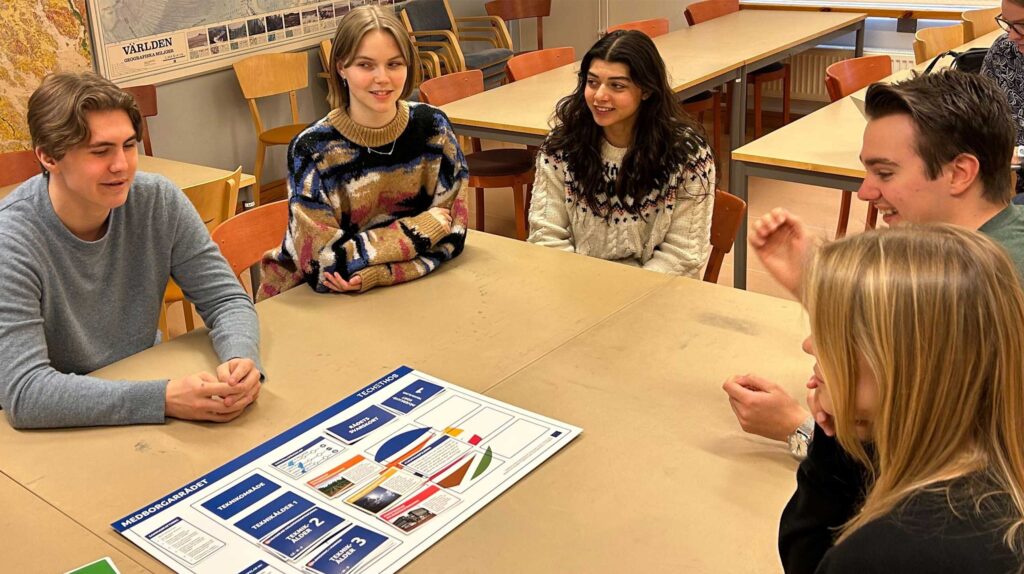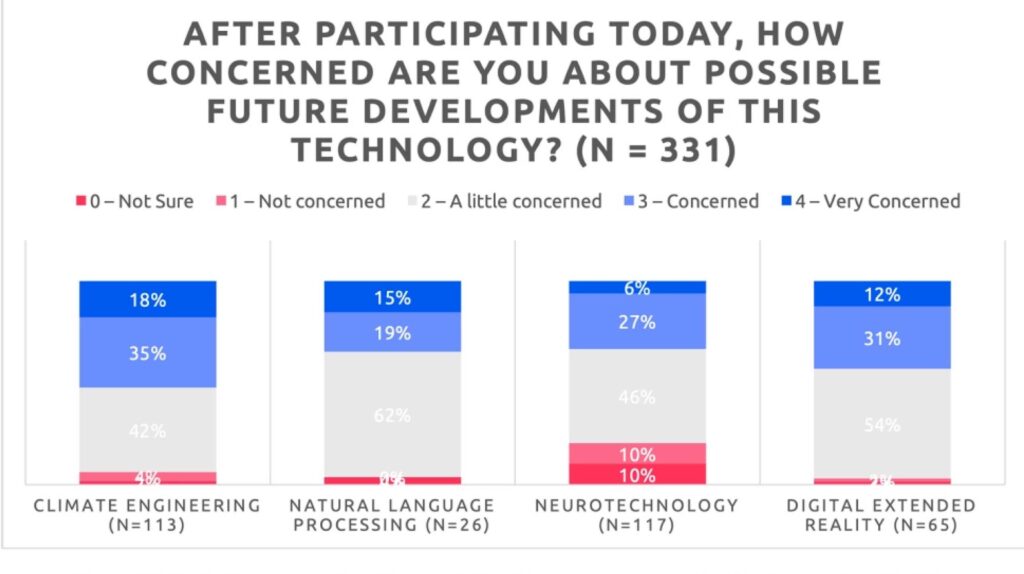From virtual reality and chatbots to the real-life impacts of climate engineering, our rapidly advancing technological landscape is changing the way we live and work. But what do citizens across Europe think about these new technologies?

In a series of science cafés and scenario game workshops held in six European cities (Vienna (Austria), Liberec (Czech Republic), Bucharest (Romania), Belgrade (Serbia), Granada (Spain), and Stockholm (Sweden), the EU TechEthos project has been exploring public awareness, attitudes and values towards new and emerging technologies. Discussions have focused around the ethics of four technology families – climate engineering (CE), digital extended reality (XR), neurotechnologies (NT), and natural language processing (NLP). In particular, the workshops centred around a scenario board game: TechEthos game: Ages of Technology Impact to find out what participants value as important in a fun and creative way, capturing both their excitement and concerns.
Here we summarise some of the findings from these public engagement activities, now available in a detailed project report, which will be used to inform ethical guidelines.
In total 20 workshops were held, three of which were run by VA (Public & Science) in locations around Stockholm. Workshop participants were recruited to represent a diverse group of individuals, including those from vulnerable groups often underrepresented in expert processes.
Participants reported that they were largely motivated to join these workshops due to their curiosity about technology (47.1%), a desire to influence technology development (16.2%), or a passion for the technology (12.5%). Gender representation was balanced across the workshops.
Awareness
Overall, there was an even distribution of awareness (very aware, somewhat aware, not really aware) among the technology families. 70% of the participants had heard of the technology families discussed, with affective computing being the least known field (48.9% not really aware) and chatbots being the most known field (47.9% very aware), both within the NLP family. The awareness of chatbots can be linked to the prevalence of these technologies in the general public’s daily lives (e.g., Apple’s Siri, Amazon’s Alexa, ChatGPT). In discussions about virtual reality (89% are somewhat or very aware) and brain-computer interfaces (74% are somewhat or very aware). Science fiction served as a prominent frame of reference, shaping awareness, perception, and value of these technologies. Looking at the specific technologies in each technology family, we see that the most prominent technologies in CE are nature-based carbon dioxide removal (CDR), in NT brain-computer interfaces, and in NLP and XR it is chatbots and virtual reality.
The least known technologies within the technology families are similarly distributed. One in three participants has not heard of solar radiation management (SRM) and Engineered CDR in CE, all three technologies in NT, and affective computing and digital twins in NLP and XR.
Citizens’ attitudes
Nature-based CDR emerged as the most favoured technology, being perceived as environmentally friendly and balanced with nature. Conversely, SRM raised significant concerns among participants due to potential unforeseen disasters and pollution.
Neuroimaging generated the most enthusiasm, promising enhanced disease diagnosis and prevention. However, the brain-computer interface elicited worries about manipulation and data protection.
Among NLP technologies, chatbots and text analysis excited participants, offering simplicity and improved work efficiency. On the other hand, affective computing raised concerns about misuse and data privacy.
In the XR family, virtual reality excited participants, providing immersive experiences of distant or historical places. Meanwhile, the metaverse caused apprehension due to potential loss of human connection and data privacy issues.

Acceptance
The results indicate that participants generally accept the presented technologies, as the votes for excitement outweigh the votes for concerns. However, it’s important to note that participants often hold both excitement and concerns simultaneously, making their acceptance more complex.
In the post-survey conducted after game exercises and group deliberations, over 70% of participants expressed excitement about possible future developments of the technologies. Simultaneously, approximately 50% of participants conveyed concerns or slight concerns regarding the technologies’ future developments.
Accepting emerging technology is complex as it involves shaping the yet-to-be-created intervention. Participants accept technology if certain conditions (X) are met or issues (Y) are prevented. Their mixed feelings of excitement and concerns reveal the need to understand shared values when discussing acceptance of emerging technologies. Reflecting on citizens’ values helps to comprehend their acceptance and to develop technologies more responsibly.
Emerging citizen values
Citizen value categories were extracted from the workshop comments through qualitative coding, allowing for comparisons across all workshops.
Each technology family exhibits distinct prominent values. In the NT domain, human health, safety, and responsibility are emphasised due to its focus on the brain and nervous system. NLP and XR prioritise authentic human connection, experience, and responsible use, considering their aim to simulate human interactions.
CE highlights ecosystem health, followed by safety, reliability, effectiveness, efficiency, and justice, given its focus on manipulating natural systems. Safety and reliability are important across all three families. Responsible use and accountability are vital in NT, NLP, and XR. Ecosystem health is a shared concern across all families.
Notably a number of common value categories emerged across the technology families through the discussions:
- Safety and reliability: Participants expressed worries about unknown effects, potential dangers, and health impacts in CE, XR, and NT.
- Equity, diversity, and inclusion: Concerns centred on global distributive justice, access for all social groups, and respecting neurodiversity.
- Responsible use and accountability: Participants stressed the importance of accountability for potential disasters, consequences, and data privacy in CE, XR, and NT.
The final stage of the project is now an exhibition in each of the six participating countries around the ethics of future technologies. In Sweden, an exhibition on climate engineering technologies will be hosted by Curiosum science centre in Umeå from late autumn. Digital versions of exhibitions will also be available to view online.
Findings from TechEthos are informing the development of valuable policy advice for the effective governance of new and emerging technologies (technologies whose development and application are not completely realised or finished, and whose potential lies in the future) at national, EU and international levels.
The full report outlining findings from the public engagement workshops can be downloaded from the TechEthos website.
